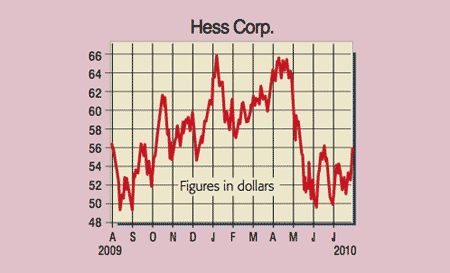
There has been plenty of press comment lately about the vast potential of shale gas and tar sands. But what of their close cousin, shale oil? This heavy crude can be converted into petrol or burned in power stations to produce electricity. Shale oil has historically been difficult to extract commercially, but with the recent advances in horizontal drilling, it’s now on the exploration road map. The largest proven reserves (such as the giant Bakken field in North Dakota) are in America.
So why is this interesting? Well, Hess, an integrated oil major with substantial up- and downstream assets, has just agreed to buy American Oil & Gas in a $445m all-stock deal to boost acreage in the Bakken region. This comes hot on the heels of its 50/50 joint venture with Toreador Resources to exploit the vast shale oil deposits south of Paris, where drilling is scheduled to begin in the fourth quarter.
While France is hardly a global hub of oil output, it soon could be. Based on seismic data, the Paris basin contains more than 50 billion barrels of shale oil. If only 10% was recoverable, it could still easily be worth north of $25bn. These are early days, but with crude hovering around $75 a barrel, I’m sure it’s only a matter of time before this fuel source is a big contributor to the world’s energy demands.
Hess Corp (NYSE: HES), rated OUTPERFORM by BMO Capital Markets
And it gets better. All told, Hess owns vast proven deposits of hydrocarbons (1.44 billion barrels of oil equivalent), which are spread across the globe in places such as the US, Thailand, Africa and the North Sea. The reason for the recent 20% decline in the stock is the firm’s exposure to the deep seas in the Gulf of Mexico (15% of production), Indonesia, and off the coast of Brazil. Not only has President Obama temporarily banned drilling, but Wall Street fears that much tougher controls will be introduced elsewhere to avoid a repeat of the BP disaster.
But given the importance of the Gulf of Mexico to its economy, I’m convinced the US’s moratorium will eventually be lifted, and operators such as Hess given the green light to develop these coveted assets. Analysts are forecasting 2010 revenues and underlying earnings per share (EPS) of $35.3bn and $4.51 respectively, lifting to $38.4bn and $5.77 in 2011. This puts the shares on undemanding price/earnings (p/e) ratios of 12.4 and 9.7. What’s more, the firm sports a robust balance sheet, with gearing at a comfortable 22.9%.
So how much is the group worth? Firstly, I’d value its proven reserves at about $18bn, its extensive downstream interests (refining, petrol stations and lubricants) at another $7bn, and its other fields, acreage and exploration licences at an extra $2bn.
So in aggregate – and after deducting net debt of $3bn and a $1.2bn pension deficit – I get an intrinsic worth of $22.8bn, equivalent to $69 per share.
As for possible curveballs, the company is exposed to the usual volatility of the crude, natural gas, refining and forex markets, plus it operates in some geopolitically challenging territories. But I’m not put off, as these worries are more than factored into the depressed share price. Hess is a bold explorer with big, undervalued assets. BMO Capital has a $80 target price.
Recommendation: BUY at $56